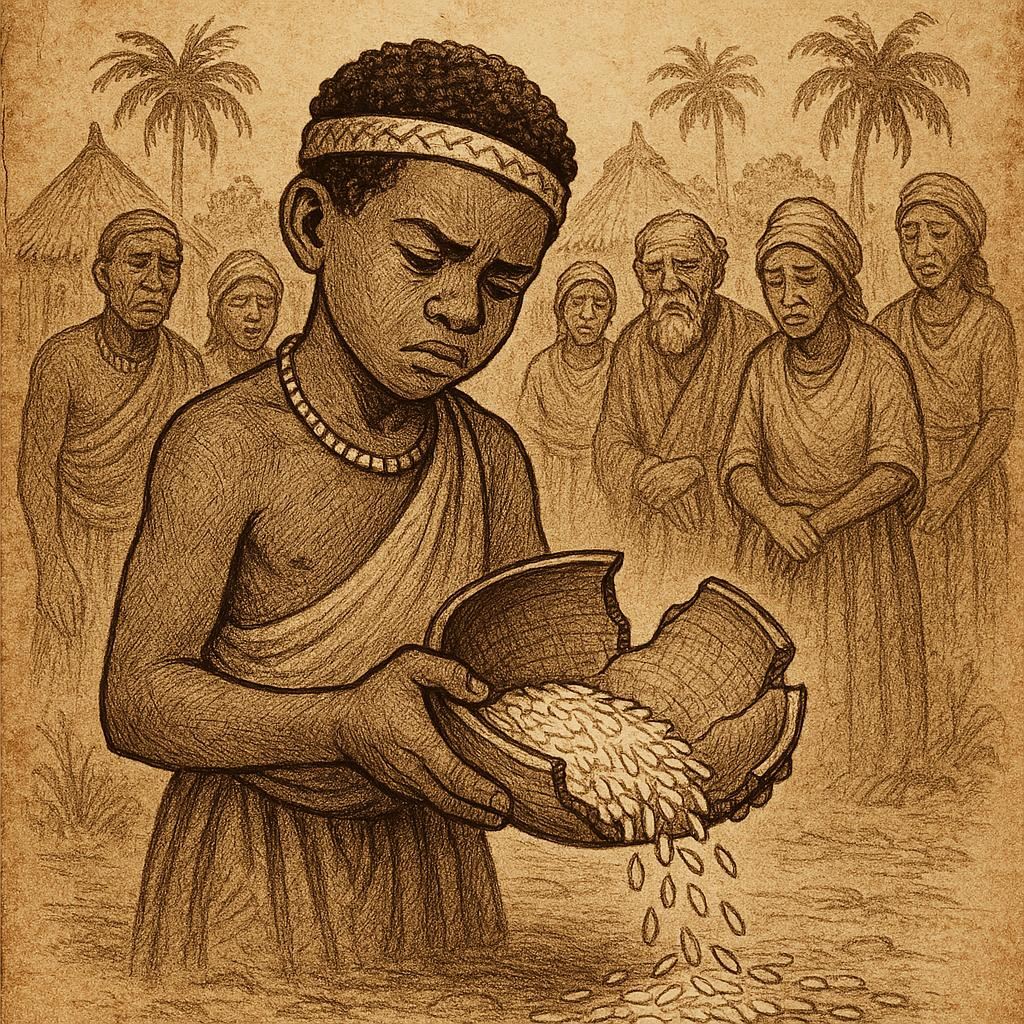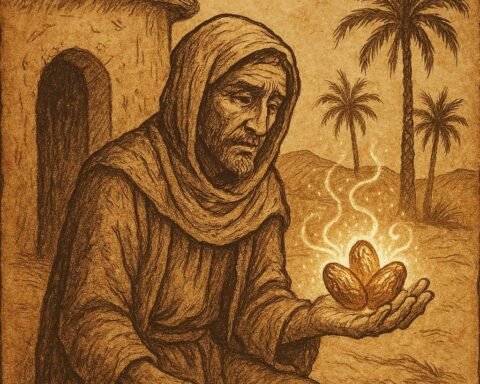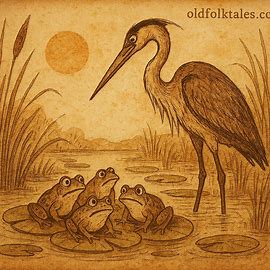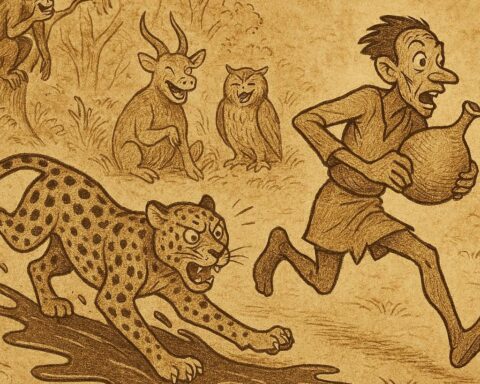Long ago in the green hills of Liberia, where the Kpelle people tilled the earth and shared the fruits of their labor, there lived a great chief who ruled a prosperous village. His people respected him for his wisdom and kindness, and they worked together to store food for times of need. The chief had one son, a young man who grew up in comfort. Unlike the hardworking villagers, he had never known hunger, nor had he ever labored in the rice fields under the hot sun. Because he never understood the value of food, he grew careless and wasteful.
Whenever the villagers brought baskets of rice into the granary, the chief’s son would take more than he needed. He cooked huge pots of rice, eating a little and throwing the rest away. He laughed when the elders reminded him that food must never be wasted. They told him that rice was sacred, a gift from both the ancestors and the earth, but the young man only shrugged and said the fields would always give more. The villagers whispered among themselves, for they feared that his greed might bring misfortune upon them all.
READ THIS: The Drum That Spoke at Midnight
One evening, while wandering outside the village after another day of wasting food, the chief’s son came upon an old man sitting beneath a tall silk-cotton tree. The man’s eyes shone with a strange light, and his voice was soft yet commanding. He asked the young man why he wasted food when so many in the world knew hunger. Embarrassed, the chief’s son stammered that he only wanted to enjoy life. The old man looked at him for a long time and then handed him a carved wooden bowl.
“This is no ordinary bowl,” the spirit said. “Whenever you are hungry, place it before you and say, Bowl, give me rice. It will fill itself with enough food to satisfy your hunger. But you must never misuse it, never waste what it gives, and never use it to boast. If you forget these words, the gift will be taken away.” With that, the spirit vanished into the night, leaving the young man trembling but excited.
The next morning, eager to test his treasure, the chief’s son placed the bowl before him and whispered the command. At once, steaming white rice appeared, fragrant and plentiful. He ate until he was satisfied, and when he was done, the rice vanished, leaving the bowl clean. Amazed, he laughed with delight. For many days he enjoyed his new gift, never worrying about the granary or the villagers’ fields.
At first, he followed the spirit’s warning and used the bowl only when hungry. But soon his pride grew. He invited his friends to watch as he commanded the bowl to fill with rice again and again, showing off his magical gift. The young men cheered, and he felt powerful, as if he were greater than his father the chief. He began to waste food once more, demanding that the bowl produce more than anyone could eat, tossing aside what remained.
The elders noticed that the chief’s son no longer came to the fields, nor did he respect the village’s traditions. They worried that his arrogance would anger the spirits. Their fears came true when, during a great feast, the young man ordered the bowl to produce rice for the entire village. He shouted the words carelessly, his voice full of pride. The bowl filled and overflowed, spilling rice across the ground. But then a terrible crack sounded, and the bowl split into pieces. The rice vanished, leaving only broken wood.
From that day forward, the fields gave less and less. The rains did not come on time, and the harvest was poor. The people suffered hunger, and they knew it was because of the chief’s son who had disrespected the gift of the spirits. Ashamed, the young man hid himself, but the villagers never forgot the lesson. They told their children and grandchildren that rice must never be wasted, for it carries the blessing of life itself.
Thus, the story of the chief’s son and the magic rice is remembered among the Kpelle as a warning. Blessings are precious and fragile. When treated with respect, they sustain a community, but when abused, they vanish and leave only sorrow behind.
Moral Lesson: The Chief’s Son and the Magic Rice teaches that greed and pride can destroy even the greatest blessings. Food is sacred and must be treated with respect, for wastefulness not only dishonors the ancestors but can also bring hardship to the whole community. True wealth comes from gratitude, humility, and the willingness to share.
Knowledge Check
What gift did the spirit give to the chief’s son in The Chief’s Son and the Magic Rice?
Answer: The spirit gave him a magical bowl that could produce endless rice.What warning did the spirit give the chief’s son about using the bowl?
Answer: He was told never to waste the rice, never misuse the gift, and never use it for boasting.How did the chief’s son first use the magical bowl?
Answer: At first he used it only when hungry, respecting the spirit’s warning.What mistake did the chief’s son make that caused the bowl to break?
Answer: He became proud, wasted rice, and used the bowl to boast during a feast.What happened to the village after the bowl broke?
Answer: The fields gave less food, the rains delayed, and famine spread through the community.What is the main moral lesson of The Chief’s Son and the Magic Rice?
Answer: The story teaches that greed and wastefulness destroy blessings and that food must be treated with respect.
Source: Kpelle folktale, Liberia. Documented in Folk Literature of the Kpelle by Vera Rubin (1963).






